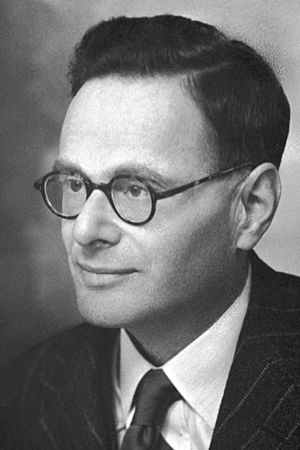Hans Krebs facts for kids
Quick facts for kids
Hans Krebs
|
|
|---|---|
 |
|
| Born | 25 August 1900 |
| Died | 22 November 1981 (aged 81) |
| Nationality | German, British |
| Alma mater | University of Göttingen University of Freiburg University of Berlin University of Hamburg |
| Known for | Discovery of the urea cycle and the citric acid cycle |
| Awards | Nobel Prize in Physiology or Medicine (1953) |
| Scientific career | |
| Fields | Internal medicine, biochemistry |
| Institutions | Kaiser Wilhelm Institute for Biology University of Hamburg Cambridge University University of Sheffield University of Oxford |
Sir Hans Krebs (born August 25, 1900 – died November 22, 1981) was a German scientist who later became a British citizen. He was a physician and a biochemist, which means he studied the chemistry of living things.
Hans Krebs is famous for his research into how living things use and change energy, a process called metabolism. He discovered two very important cycles in the body: the urea cycle and the citric acid cycle. The citric acid cycle is also known as the Krebs Cycle, named after him. For these discoveries, he won the Nobel Prize in Physiology or Medicine in 1953.
Contents
Early Life and Learning
Hans Krebs was born in Hildesheim, Germany. His mother was Alma Davidson, and his father, Georg Krebs, was a doctor who specialized in ears, nose, and throat.
Becoming a Doctor and Scientist
Hans Krebs studied medicine at the University of Göttingen and the University of Freiburg from 1918 to 1923. He earned his Ph.D. (a high-level university degree) from the University of Hamburg in 1925.
After that, he spent a year studying chemistry in Berlin. In Berlin, he worked with a famous scientist named Otto Heinrich Warburg at the Kaiser Wilhelm Institute for Biology until 1930. This experience helped him learn a lot about how the body works at a chemical level.
Krebs's Scientific Journey
Krebs started his career working as a doctor at the Altona hospital and also at the University of Freiburg. It was at the University of Freiburg that he began his important research on the urea cycle. This cycle explains how our bodies get rid of harmful waste products.
Moving to England
In 1933, Hans Krebs had to leave Germany because of his Jewish background. He moved to England, where he continued his scientific work. In England, he worked at Cambridge with another famous scientist, Sir Frederick Gowland Hopkins. There, he focused on biochemistry.
In 1945, he became a Professor (a senior teacher and researcher) at the University of Sheffield. Later, in 1954, he became a professor at the University of Oxford. Even after he officially retired, Krebs kept working at the Radcliffe Infirmary until he passed away. He was also a fellow of Trinity College in Oxford.
Awards and Recognition
In 1953, Hans Krebs received the Nobel Prize in Physiology or Medicine for his amazing "discovery of the citric acid cycle." This cycle is a key part of how cells create energy. In 1958, he was honored by the Queen and became a knight, which is why he is called "Sir" Hans Krebs.
In 1979, he was also made an Honorary Fellow of Girton College at Cambridge University.
Family Life
In 1938, Hans Krebs married Margaret Cicely Fieldhouse. They had three children together: two sons and one daughter. Their son John Krebs became an ornithologist, a scientist who studies birds. He also became a member of the House of Lords, which is part of the British Parliament. Their other son was named Paul, and their daughter was Helen.
Hans Krebs passed away in Oxford, England, in 1981.
Important Dates
- 1900 Born in Germany
- 1918 Started medical school
- 1923 Finished medical school
- 1925 Earned his Ph.D. from University of Hamburg
- 1932 Identified the Urea cycle
- 1933 Moved to the United Kingdom
- 1937 Identified the Citric acid cycle
- 1945 Became a Professor at University of Sheffield
- 1953 Won the Nobel Prize
- 1958 Became a knight
- 1981 Died in Oxford, England
See also
 In Spanish: Hans Krebs para niños
In Spanish: Hans Krebs para niños
 | Roy Wilkins |
 | John Lewis |
 | Linda Carol Brown |

